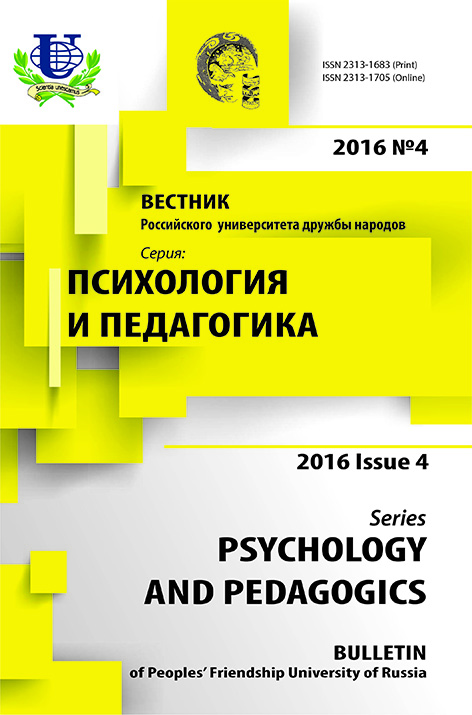ВВЕДЕНИЕ ПРОГРАММЫ БИЛИНГВАЛЬНОГО И ТВОРЧЕСКОГО ОБРАЗОВАНИЯ В УЧЕБНЫЙ ПЛАН РОССИЙСКИХ ШКОЛ
- Авторы: Хархурин А.В.1
-
Учреждения:
- Американский университет Шарджи
- Выпуск: № 4 (2016)
- Страницы: 16-28
- Раздел: Статьи
- URL: https://journals.rudn.ru/psychology-pedagogics/article/view/15106
- DOI: https://doi.org/10.22363/2313-1683-2016-4-16-28
Цитировать
Полный текст
Аннотация
В данной статье представлена проблема, широко обсуждаемая как в исследованиях билингвизма, так и в исследованиях творческих процессов, рассматриваемая с точки зрения ее педагогических приложений. Исследования, проведенные автором в последние десятилетия, убедительно доказывают, что владение более чем одним языком способствует развитию творческих способностей человека. Автор расширил сферу своих исследований и применил их результаты в области образования. Предлагаемый авторский новый подход объединяет стратегии обучения, используемые в обеих областях (билингвизм и творчество), в единой программе билингвального и творческого образования. Целью программы является преподавание дисциплин на двух языках и развитие творческого потенциала школьников. Для достижения этой цели программа использует комплексный подход, который объединяет когнитивные, личностные и средовые факторы образования. В статье обсуждается данный подход и предлагаются направления для реализации предлагаемой программы в России.
Ключевые слова
Об авторах
Анатолий Владимирович Хархурин
Американский университет Шарджи
Автор, ответственный за переписку.
Email: psyj@rudn.university
P.O. Box 26666, Шарджа, ОАЭ
Список литературы
- Amabile T.M. The social psychology of creativity. New York: Springer-Verlag, 1983. 246 p.
- August D., Hakuta K. Improving schooling for language-minority children: A research agenda. Washington, DC: National Academy Press, 1997. 504 p.
- Commission of European Communities. Improving competences for the 21st century: An agenda for European cooperation on schools Communication from the Commission to the European Parliament, the Council, the European Economic and Social Committee and the Committee of the Regions. Brussels, 2008. 12 p.
- Commission of European Communities. Results of the consultation on the education of children from a migrant background Commission Staff Working Document. Brussels, 2009. 36 p.
- Craft A. Creativity in schools: Tensions and dilemmas. London, UK: Routledge, 2005. 224 p.
- Craft A. Possibility thinking in the early years and primary classroom. In: A.-G. Tan (Ed.),Creativity: A handbook for teachers. Singapore: World Scientific, 2007, pp. 231-249.
- Cropley A.J. More ways than one: Fostering creativity. Westport, CT US: Ablex Publishing, 1992.132 p.
- Cropley A.J. Creativity in education & learning: A guide for teachers and educators. London, UK: Kogan Page, 2001. 208 p.
- Department for Education and Employment/Qualifications and Curriculum Authority. The National Curriculum handbook for primary teachers in England. London, 1999. 152 p.
- Department for Education and Employment/Qualifications and Curriculum Authority. The National Curriculum handbook for secondary teachers in England. London, 1999. 223 p.
- European Council. Presidency conclusions. Barcelona, 2002. 72 p.
- Feldhusen J.F., Kolloff M.B. A three-stage model for gifted education. Gifted Child Today, 1978, vol. 1, pp. 3-5, 53-57.
- Garcia E.E. Bilingual education in the United States In: J. Altarriba, R.R. Heredia (Eds.), An introduction to bilingualism: Principles and processes. Mahwah, NJ: Lawrence Erlbaum Associates Publishers, 2008, pp. 321-343.
- Guilford J.P. Creativity. American Psychologist, 1950, vol. 5, pp. 444-454.
- Guilford J.P. The Nature of Human Intelligence. New York: McGraw-Hill, 1967.
- Kaufman J.C., Beghetto R.A. Beyond big and little: The four c model of creativity. Review of General Psychology, 2009, vol. 13, pp. 1-12.
- Kharkhurin A.V. Multilingualism and Creativity. Bristol, UK: Multilingual Matters, 2012. 240 p.
- Kharkhurin A.V. Creativity.4in1: Four-criterion construct of creativity. Creativity Research Journal,2014, vol. 26, pp. 338-352.
- Kharkhurin A.V. Multilingual creative cognition: Theory and practice. In R. Jones (Ed.), Routledge Handbook of Language and Creativity (pp. 452-466). London, UK: Routledge, 2015.
- Kharkhurin A.V. Multi-competence as a creative act: Ramifications of multi-competence paradigm for creativity research and creativity fostering education. In V. Cook & W. Li (Eds.). Cambridge Handbook of Linguistic Multi-competence (pp. 420-444). Cambridge, UK: Cambridge University Press, 2016. doi: 10.1017/CBO9781107425965.020
- Marsh D., Hill R. Study on the Contribution of Multilingualism to Creativity. Final Report. Brussels: European Commission, 2009. 24 p.
- McLeod B. School reform and student diversity: Exemplary schooling for language minority students.Washington, DC: George Washington University: Institute for the Study of Language and Education, 1996. 70 p.
- Nickerson R.S. Enhancing creativity. In: R.J. Sternberg (Ed.), Handbook of creativity. New York, NY: Cambridge University Press, 1999, pp. 392-430.
- Nickerson R.S., Sternberg R.J. The teaching of thinking and problem solving. Thinking and problem solving. San Diego, CA US: Academic Press, 1994, pp. 409-449.
- Perkins D.N., Laserna C. Inventive thinking. In: M.J. Adams (Ed.), Odyssey: A curriculum for thinking. Watertown, MA: Mastery Education Corporation, 1986.
- Runco M.A. Creativity. Annual Review of Psychology, 2004, vol. 55, pp. 657-687.
- Starko A.J. Creativity in the classroom: Schools of curious delight / 4th ed. New York, NY: Routledge, 2010. 356 p.
- Thomas W.P., Collier V.P. A national study of school effectiveness for language minority students’ long-term academic achievement. Final Report. Berkeley, CA: Center for Research on Education, Diversity & Excellence, University of California, 2000. 8 p.
- Torrance E.P. A longitudinal examination of the fourth grade slump in creativity. Gifted Child Quarterly, 1968, vol. 12, pp. 195-199.
- Urban K.K. Openness: A “magic formula” for an adequate development and promotion of giftedness and talents?! Gifted and Talented International, 1995, vol. 10, pp. 15-19.
- Vygotsky L.S. Imagination and creativity in childhood. [Воображение и творчество в детском возрасте]. Journal of Russian and East European Psychology, 1967/2004, vol. 42, pp. 7-97.















